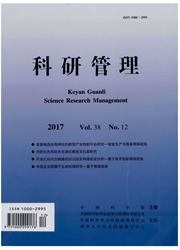

 中文摘要:
中文摘要:
委托代理理论重点研究委托人在信息不完全的情况下,通过制定相应措施来激励代理人朝委托人希望的方向去努力,主要工具是静态激励模型和动态激励模型。本文借助于委托代理动态激励模型,研究了在企业创新管理中,领导如何在不具备某些信息的情况下,激励员工在工作中保持长期的创新动力,完善企业创新动力机制中的政策激励。分别构建了在道德风险、以及逆向选择与道德风险共存等两种情况下,员工在常规工作和创新工作中的努力分配情况的连续时间模型,讨论了两种情况下最优激励合约的变化情况,并通过比较发现在过去与未来无关的条件下,员工的努力水平与将保持不变,并根据自己的利益来选择努力方向,忽视企业创新工作。建议在企业创新的政策激励动力机制中,将员工的过去业绩及努力成本都纳入到绩效评价体系中,来激励员工在不同时期调整其创新努力水平。
 英文摘要:
英文摘要:
The Principal - Agent Theory is a research on incentive contract to promote the agent to fulfill the purpose of the prin- cipal in lack of perfect information based on the main tools of the static incentive model and the dynamic incentive model. This paper focuses on how the leaders will motivate the workers to do long - run innovation and improve the policy incentives in the en- terprise ' s dynamic mechanism in the innovation management of the enterprise in lack of some information by light of the principal - agent dynamic model. This paper construct respectively the continuous - time models for the distribution of the employee' s ef- forts in the conventional work and the innovative work under the situations where the moral hazard exists only, and where both the adverse selection and the moral hazard and coexist, and discusses the changes of the optimal incentive contracts under such two circumstances. It is also found out through comparison that the effort level of employees will remain unchanged when the past in irrelevant to the future and they will select the directions of efforts according to their own interests ignoring the innovation of the enterprise. Thus, it is proposed that in the dynamic mechanism of policy motivation in the enterprise innovation, both the past performance and the effort costs of the employees should be included in the performance evaluation system to motivate the workers to adjust their effort levels on innovation at different periods.
 同期刊论文项目
同期刊论文项目
 同项目期刊论文
同项目期刊论文
 期刊信息
期刊信息
